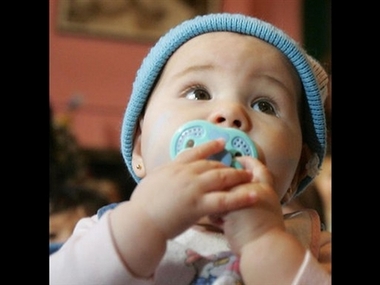Infants form memories, but forget them
(AP)Updated: 2007-02-17 15:50
SAN FRANCISCO - Adults thinking back rarely can remember anything before preshool, but those bright infant eyes staring back at mommy and daddy really are forming memories.
It's just that babies also forget. In fact, babies' rate of forgetting is even faster than that of adults, Patricia J. Bauer of Duke University said Friday at the annual meeting of the American Association for the Advancement of Science.
Researchers have long speculated that babies' brains were simply unable to form memories, but Bauer said new research indicates that is incorrect.
While rates of memory development vary among infants, all babies are extremely intelligent, added Lisa M. Oakes of the University of California, Davis. "The task they have before them is overwhelming."
Infants are very good at extracting information from their environment, said Oakes.
The ability to form memories depends on a network of structures in the brain and these develop at different times, Bauer said. As the networks come together between 6 months and 18 months of life, researchers see increased efficiency in the ability to form short- and long-term memory, she said.
From age six months to two years, memory increases from about 24 hours to a year, she said.
But, noting that children, like adults, forget, she compared the brains of infants and adults to colanders used to drain food. The adult colander has small holes, for draining something like orzo or rice, while the infant colander has larger holes, such as for draining large penne pasta, but allowing more information to flow out.
Adults' earliest memory of childhood tends to be of emotional events, either positive or negative, she added.
"Our lives completely depend on being able to remember the past," Bauer said, and that matures during the first two years of life.
Bauer said infants were tested by using objects such as cups and blocks. In one test a baby would be shown two cups, a block would be put into one, the other cup would be put over the top and the group would be shaken to form a rattle.
This is something children don't do instinctively, she explained, but once they see it they can copy it, and researchers can see how long they remember when given the same objects.
Oakes said she studied infants by watching how long they would look at something. Babies will look longer at something new than something they are familiar with, she said, which allows researchers to calculate how long the baby remembers something.
Tracy DeBoer of the University of California, Davis, said babies born to diabetic mothers are at increased risk of memory loss. Such children may have shortages of oxygen and iron before birth and that can cause impaired memory when they are growing.
That impairment did not occur in cases where the mothers' diabetes was controlled during pregnancy, she added.
|
||
|
||
|
|

